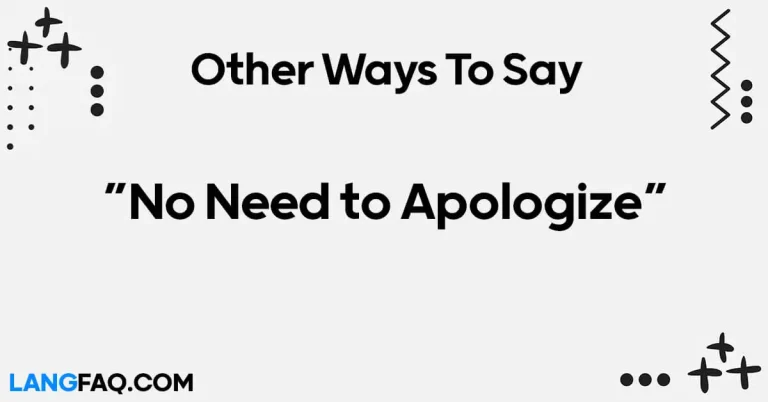In the realm of professional communication, the phrase “Please Advise” has been a staple for seeking guidance or instruction. However, diversifying your vocabulary can significantly enhance the clarity and effectiveness of your communication. In this article, we’ll explore ten alternative phrases that serve the same purpose as “Please Advise,” offering variety and nuance to your interactions.
12 Other Ways to Say “Please Advise”
Here are 12 alternative phrases you can use instead of “Please Advise”:
- Kindly provide guidance on
- I would appreciate your input regarding
- Could you offer your expertise on
- I’m seeking your advice concerning
- Would you mind sharing your thoughts about
- Can you recommend a course of action for
- I’m looking for your insights on
- May I ask for your suggestions regarding
- Could you lend your expertise to help with
- I’m interested in hearing your perspective on
- Would you be able to offer direction on
- Could you provide feedback on
| Alternative Phrase | Meaning | Example |
|---|---|---|
| Kindly provide guidance on… | Requesting assistance or direction politely. | Kindly provide guidance on the next steps. |
| I would appreciate your input regarding… | Seeking input or feedback respectfully. | I would appreciate your input regarding the project. |
| Could you offer your expertise on… | Requesting specialized knowledge or advice. | Could you offer your expertise on this matter? |
| I’m seeking your advice concerning… | Requesting guidance or suggestions formally. | I’m seeking your advice concerning the budget. |
| Would you mind sharing your thoughts about… | Asking for opinions or viewpoints politely. | Would you mind sharing your thoughts about the proposal? |
| Can you recommend a course of action for… | Asking for recommendations or suggestions. | Can you recommend a course of action for our marketing strategy? |
| I’m looking for your insights on… | Seeking valuable perspectives or observations. | I’m looking for your insights on the market trends. |
| May I ask for your suggestions regarding… | Formally requesting advice or recommendations. | May I ask for your suggestions regarding the upcoming event? |
| Could you lend your expertise to help with… | Requesting assistance based on expertise. | Could you lend your expertise to help with the presentation? |
| I’m interested in hearing your perspective on… | Inviting someone to share their viewpoint. | I’m interested in hearing your perspective on the new project. |
| Would you be able to offer direction on… | Requesting guidance or instruction. | Would you be able to offer direction on the project timeline? |
| Could you provide feedback on… | Asking for evaluation or critique politely. | Could you provide feedback on the draft report? |
Using alternative phrases to “Please Advise” offers a variety of ways to politely request guidance, feedback, or assistance in professional communication. By diversifying your vocabulary, you can enhance clarity and foster effective collaboration in your interactions.
Is It Correct to Say “Please Advise”?
Yes, “Please advise” is a commonly used phrase in English, particularly in professional or formal contexts. It is used to politely request guidance, information, or action from someone. However, it’s worth noting that some people prefer alternative phrases such as “Please let me know” or “I would appreciate your advice” as they may find “Please advise” to be overly abrupt or directive. Ultimately, the appropriateness of using “Please advise” depends on the context and the relationship between the speaker and the recipient.
Professional Mail Example With “Please Advise”
Subject: Clarification Needed Regarding Project Timeline
Dear [Recipient’s Name],
I hope this email finds you well. I am writing to seek clarification regarding the timeline for the upcoming project.
As we approach the deadline, there seems to be some ambiguity regarding the final deliverables and milestones. Could you please advise on the specific tasks that need to be completed by the end of the week? Additionally, if there are any adjustments or updates to the project schedule, I would appreciate your guidance on how we can best align our efforts to meet the deadline.
Your expertise in project management is invaluable, and I trust your insights will help us ensure the successful completion of the project. If possible, I would be grateful for your prompt response to help us address any potential challenges proactively.
Thank you for your attention to this matter.
Best regards, [Your Name]
Kindly provide guidance on
When navigating through unfamiliar territory or facing a challenging situation, seeking guidance is often the first step towards finding a solution. The phrase “Kindly provide guidance on…” is a polite and respectful way to request assistance or direction from someone who may have more experience or expertise in the matter at hand.
Formal Context:
In a formal setting, such as a professional email or a business meeting, using this phrase conveys professionalism and courtesy. It acknowledges the recipient’s authority or knowledge while expressing a sincere request for their guidance.
Example Sentence:
“Dear [Recipient’s Name],
I hope this email finds you well. I am currently working on [project/task] and would greatly appreciate your expertise. Kindly provide guidance on the best approach to [specific aspect of the project/task].
Thank you in advance for your assistance.
Best regards, [Your Name]”
Informal Context:
Even in more casual or informal settings, such as seeking advice from a mentor or a trusted colleague, using a polite and respectful tone is still important. This phrase can be adapted to suit the relationship and context while maintaining a courteous demeanor.
Example Sentence:
“Hey [Mentor’s Name],
I’m facing a bit of a challenge with [issue/task], and I was hoping you could help me out. Could you kindly provide guidance on how to tackle this situation?
Thanks a bunch!
Best, [Your Name]”
Variations:
- “Could you offer your expertise on…”
- “I’m seeking your advice concerning…”
- “Would you be able to offer direction on…”
Dictionary Insight:
According to Cambridge Dictionary, “guidance” refers to the act of providing help or advice to someone to assist them in making a decision or understanding a situation. It emphasizes the role of the person providing assistance as a source of knowledge or direction.
Usage Tips:
- Use this phrase when seeking assistance or direction in a respectful and courteous manner.
- Adjust the tone and formality of the request based on the relationship and context.
- Express gratitude for the recipient’s guidance to reinforce appreciation for their assistance.
Pros and Cons:
- Pros: Conveys politeness and respect, suitable for formal and informal communication, acknowledges the recipient’s expertise.
- Cons: May sound overly formal in very casual situations, could be perceived as passive if not followed by specific details or questions.
I would appreciate your input regarding
In collaborative environments, soliciting input from others can lead to richer discussions and better outcomes. “I would appreciate your input regarding…” is a courteous and inclusive way to invite others to share their thoughts, opinions, or feedback on a particular matter.
Formal Context:
In professional settings, such as team meetings or project discussions, using this phrase demonstrates respect for colleagues’ perspectives and contributions. It acknowledges the value of their input while emphasizing the importance of collaboration.
Example Sentence:
“Good afternoon team,
As we continue to brainstorm ideas for the upcoming project, I would appreciate your input regarding the proposed marketing strategies. Your insights and expertise are invaluable in shaping our approach.
Thank you for your contributions.
Best regards, [Your Name]”
Informal Context:
Even in informal settings, such as group discussions or brainstorming sessions, fostering open communication and inviting input from others is essential. This phrase can be adapted to suit the context while maintaining a friendly and respectful tone.
Example Sentence:
“Hey everyone,
I’m excited to hear your thoughts on the new project proposal. I would really appreciate your input regarding the potential challenges we might face and how we can overcome them together.
Looking forward to our discussion!
Best, [Your Name]”
Variations:
- “Your thoughts on…”
- “Any insights to share about…”
- “Mind sharing your perspective on…”
Dictionary Insight:
According to Merriam-Webster, “input” refers to advice, opinions, or information provided by someone to contribute to a decision or discussion. It emphasizes the act of actively participating and contributing to a collective effort.
Usage Tips:
- Use this phrase to encourage active participation and collaboration in discussions or decision-making processes.
- Be specific about the topic or area where input is needed to provide clarity and focus for respondents.
- Express appreciation for the input received to reinforce the value of contributors’ contributions.
Pros and Cons:
- Pros: Promotes inclusivity and collaboration, encourages diverse perspectives, fosters open communication.
- Cons: May sound formal in very casual contexts, requires follow-up actions to acknowledge and address input received.
Could you offer your expertise on
When faced with complex challenges or decisions, seeking the expertise of others can provide valuable insights and guidance. “Could you offer your expertise on…” is a polite and respectful way to request assistance or advice from someone who possesses specialized knowledge or experience in a particular area.
Formal Context:
In professional environments, especially when seeking guidance from subject matter experts or senior colleagues, using this phrase demonstrates humility and respect for their expertise. It acknowledges their specialized knowledge while expressing a genuine desire to benefit from their insights.
Example Sentence:
“Dear [Recipient’s Name],
I am currently working on [project/task], and I believe your expertise in [specific area] would be invaluable. Could you offer your expertise on the best approach to [specific aspect of the project/task]?
Thank you for considering my request.
Best regards, [Your Name]”
Informal Context:
Even in more casual or informal interactions, such as seeking advice from a mentor or experienced friend, maintaining a respectful tone is important. This phrase can be adapted to suit the relationship and context while conveying genuine appreciation for the recipient’s knowledge and experience.
Example Sentence:
“Hey [Mentor’s Name],
I could really use your expertise on [issue/task] – I know you’ve dealt with similar situations before. Could you offer your expertise on how to handle this effectively?
Thanks a bunch!
Best, [Your Name]”
Variations:
- “Can you provide insight into…”
- “I’m seeking your advice on…”
- “Would you mind sharing your knowledge about…”
Dictionary Insight:
According to Oxford Languages, “expertise” refers to expert skill or knowledge in a particular field or subject. It emphasizes proficiency and specialized understanding, often gained through experience or training.
Usage Tips:
- Use this phrase when seeking advice or assistance from someone with specialized knowledge or experience in a specific area.
- Be clear and specific about the aspect of the project or task where expertise is needed to facilitate a targeted response.
- Express gratitude for the recipient’s expertise and willingness to share their insights to reinforce appreciation for their assistance.
Pros and Cons:
- Pros: Demonstrates respect for the recipient’s expertise, fosters collaboration and knowledge-sharing, facilitates informed decision-making.
- Cons: May sound formal in very casual contexts, requires follow-up actions to apply the expertise received effectively.
I’m seeking your advice concerning
In situations where you require guidance or recommendations on a specific matter, expressing your need for advice in a polite and respectful manner is essential. “I’m seeking your advice concerning…” is a formal and courteous way to request assistance or direction from someone whose opinion you value and trust.
Formal Context:
In professional settings, particularly when seeking guidance from supervisors, mentors, or senior colleagues, using this phrase conveys professionalism and respect for their authority or experience. It acknowledges their role as a source of valuable advice while expressing a genuine need for assistance.
Example Sentence:
“Dear [Recipient’s Name],
I hope this email finds you well. I’m currently facing a challenge with [issue/task], and I believe your advice could provide valuable insights. I’m seeking your advice concerning the best approach to [specific aspect of the issue/task].
Thank you for considering my request.
Warm regards, [Your Name]”
Informal Context:
Even in informal interactions, such as seeking advice from a trusted friend or colleague, maintaining a respectful tone is important. This phrase can be adapted to suit the relationship and context while conveying genuine appreciation for the recipient’s perspective and guidance.
Example Sentence:
“Hey [Friend’s/Colleague’s Name],
I could really use your advice on [issue/task] – I value your opinion and insights. I’m seeking your advice concerning how to navigate this situation effectively.
Thanks for always being there to lend an ear!
Best, [Your Name]”
Variations:
- “Could you offer your perspective on…”
- “I’d appreciate your thoughts on…”
- “Mind sharing your advice about…”
Dictionary Insight:
According to Lexico, “advice” refers to guidance or recommendations offered to help someone make a decision or deal with a problem. It emphasizes the role of the advisor in providing support and assistance based on their experience or knowledge.
Usage Tips:
- Use this phrase when seeking guidance or recommendations on a specific matter from someone whose opinion you value and trust.
- Be clear and specific about the aspect of the issue or task where advice is needed to facilitate a targeted response.
- Express gratitude for the recipient’s advice and willingness to share their insights to reinforce appreciation for their assistance.
Pros and Cons:
- Pros: Demonstrates respect for the recipient’s opinion, fosters trust and collaboration, facilitates informed decision-making.
- Cons: May sound overly formal in very casual contexts, requires follow-up actions to apply the advice received effectively.
Would you mind sharing your thoughts about
In collaborative environments, inviting others to share their thoughts fosters open communication and encourages active participation. “Would you mind sharing your thoughts about…” is a polite and inclusive way to request input or feedback from others, acknowledging the value of their perspective.
Formal Context:
In professional settings, especially during meetings or discussions, using this phrase demonstrates respect for participants’ opinions and encourages them to contribute to the conversation. It creates an open and inclusive atmosphere where everyone feels valued and heard.
Example Sentence:
“Good morning team,
As we review the proposed changes to our project timeline, would you mind sharing your thoughts about how these adjustments may impact our overall schedule? Your insights are crucial to ensuring we make informed decisions moving forward.
Best regards, [Your Name]”
Informal Context:
Even in more casual or informal interactions, such as brainstorming sessions or team collaborations, maintaining a respectful tone is important. This phrase can be adapted to suit the relationship and context while encouraging open dialogue and participation.
Example Sentence:
“Hey everyone,
I’ve been thinking about the new project direction, and I’d love to hear your thoughts about the proposed strategies. Would you mind sharing your thoughts about how we can approach this challenge together?
Looking forward to hearing your ideas!
Best, [Your Name]”
Variations:
- “What are your feelings on…”
- “Can you provide insight into…”
- “I’m interested in hearing your perspective on…”
Dictionary Insight:
According to Merriam-Webster, “thoughts” refer to opinions, ideas, or beliefs formed in the mind. It emphasizes the subjective nature of individuals’ perspectives and the importance of considering multiple viewpoints in discussions.
Usage Tips:
- Use this phrase to encourage active participation and diverse perspectives in discussions or decision-making processes.
- Be open-minded and receptive to the thoughts and opinions shared by others, fostering a collaborative environment where everyone’s input is valued.
- Express gratitude for the contributions and insights shared by participants to reinforce appreciation for their engagement.
Pros and Cons:
- Pros: Promotes inclusivity and collaboration, encourages diverse perspectives, fosters open communication.
- Cons: May sound overly formal in very casual contexts, requires follow-up actions to address the thoughts and opinions shared effectively.
Can you recommend a course of action for
When faced with decision-making or problem-solving scenarios, seeking recommendations from others can provide valuable insights and options. “Can you recommend a course of action for…” is a polite and respectful way to request advice or suggestions from someone who may have expertise or experience relevant to the situation.
Formal Context:
In professional environments, particularly when seeking guidance from supervisors, mentors, or subject matter experts, using this phrase conveys professionalism and respect for their knowledge or expertise. It demonstrates a willingness to consider alternative approaches and benefit from their insights.
Example Sentence:
“Dear [Recipient’s Name],
As we strategize for the upcoming product launch, I would greatly appreciate your input. Can you recommend a course of action for optimizing our marketing efforts to reach our target audience effectively?
Thank you for your guidance.
Best regards, [Your Name]”
Informal Context:
Even in more casual or informal interactions, such as seeking advice from a colleague or friend, maintaining a respectful tone is important. This phrase can be adapted to suit the relationship and context while expressing genuine interest in the recipient’s recommendations.
Example Sentence:
“Hey [Friend’s/Colleague’s Name],
I’m brainstorming ideas for my upcoming presentation, and I’d love to hear your thoughts. Can you recommend a course of action for structuring the content to ensure maximum engagement from the audience?
Thanks for your help!
Best, [Your Name]”
Variations:
- “What would you suggest for…”
- “Do you have any recommendations for…”
- “I’m looking for your advice on…”
Dictionary Insight:
According to Oxford Languages, a “course of action” refers to a plan or series of actions designed to achieve a particular goal or outcome. It emphasizes the need for strategic thinking and decision-making in navigating complex situations.
Usage Tips:
- Use this phrase when seeking advice or suggestions on potential courses of action from someone with relevant expertise or experience.
- Provide context and background information to help the recipient understand the situation and offer informed recommendations.
- Express appreciation for the recommendations received and be open to considering alternative perspectives or approaches.
Pros and Cons:
- Pros: Demonstrates respect for the recipient’s expertise, fosters collaboration and knowledge-sharing, facilitates informed decision-making.
- Cons: May sound overly formal in very casual contexts, requires follow-up actions to implement the recommendations effectively.
I’m looking for your insights on
When seeking a deeper understanding of a situation or topic, inviting others to share their insights can provide valuable perspectives and enhance decision-making. “I’m looking for your insights on…” is a respectful and inclusive way to request input or observations from individuals who may offer valuable perspectives or expertise.
Formal Context:
In professional environments, particularly during meetings or strategic discussions, using this phrase conveys professionalism and respect for participants’ expertise or experience. It encourages active engagement and fosters a collaborative environment where diverse viewpoints are valued.
Example Sentence:
“Good afternoon team,
As we analyze the market trends for the upcoming quarter, I’m looking for your insights on the potential opportunities and challenges we may encounter. Your perspectives will be invaluable in shaping our strategic approach moving forward.
Thank you for your contributions.
Best regards, [Your Name]”
Informal Context:
Even in more casual or informal interactions, such as brainstorming sessions or team collaborations, maintaining a respectful tone is important. This phrase can be adapted to suit the relationship and context while inviting open dialogue and participation.
Example Sentence:
“Hey everyone,
I’ve been thinking about our project goals, and I’d love to hear your insights on how we can achieve them effectively. I value your perspectives and ideas, so please feel free to share your thoughts.
Looking forward to our discussion!
Best, [Your Name]”
Variations:
- “What are your thoughts on…”
- “Can you provide your perspective on…”
- “I’d appreciate your viewpoint on…”
Dictionary Insight:
According to Merriam-Webster, “insights” refer to the understanding of the true nature of something, often gained through observation or reflection. It emphasizes the value of personal observations and interpretations in gaining deeper understanding.
Usage Tips:
- Use this phrase when seeking input or observations from others to gain a deeper understanding of a situation or topic.
- Encourage participants to share their unique perspectives and experiences to enrich the discussion and decision-making process.
- Express gratitude for the insights shared and acknowledge the value of diverse viewpoints in shaping outcomes.
Pros and Cons:
- Pros: Encourages collaboration and diverse perspectives, fosters a deeper understanding of complex issues, promotes open communication.
- Cons: May sound overly formal in very casual contexts, requires follow-up actions to apply the insights received effectively.
May I ask for your suggestions regarding
When seeking advice or recommendations from others, it’s important to approach the request with politeness and respect. “May I ask for your suggestions regarding…” is a courteous and formal way to request input or guidance from someone whose opinion you value and trust.
Formal Context:
In professional environments, particularly when seeking guidance from supervisors, mentors, or senior colleagues, using this phrase conveys professionalism and respect for their authority or expertise. It demonstrates humility and a willingness to consider alternative perspectives.
Example Sentence:
“Dear [Recipient’s Name],
I hope this email finds you well. As we work towards improving our customer service processes, may I ask for your suggestions regarding strategies for enhancing customer satisfaction? Your insights and recommendations would be greatly appreciated.
Thank you for your time and consideration.
Best regards, [Your Name]”
Informal Context:
Even in more casual or informal interactions, such as seeking advice from a friend or colleague, maintaining a respectful tone is important. This phrase can be adapted to suit the relationship and context while expressing genuine interest in the recipient’s input.
Example Sentence:
“Hey [Friend’s/Colleague’s Name],
I’m brainstorming ideas for our team project, and I’d love to hear your suggestions. May I ask for your suggestions regarding how we can streamline our workflow and improve productivity?
Thanks for your help!
Best, [Your Name]”
Variations:
- “Could you offer some suggestions on…”
- “I’d appreciate your input on…”
- “Mind sharing your thoughts about…”
Dictionary Insight:
According to Lexico, “suggestions” refer to ideas or recommendations offered as a possible course of action. It emphasizes the role of providing potential solutions or approaches to a problem or challenge.
Usage Tips:
- Use this phrase when seeking advice or recommendations from someone whose opinion you value and trust.
- Provide context and background information to help the recipient understand the specific area where suggestions are needed.
- Express gratitude for the suggestions received and be open to considering alternative viewpoints or approaches.
Pros and Cons:
- Pros: Demonstrates respect for the recipient’s expertise, fosters collaboration and knowledge-sharing, facilitates informed decision-making.
- Cons: May sound overly formal in very casual contexts, requires follow-up actions to implement the suggestions effectively.
Could you lend your expertise to help with
In situations where specialized knowledge or experience is required, seeking assistance from someone with expertise can be invaluable. “Could you lend your expertise to help with…” is a polite and respectful way to request assistance or advice from someone who possesses specialized skills or knowledge.
Formal Context:
In professional environments, particularly when seeking guidance from subject matter experts or senior colleagues, using this phrase demonstrates respect for their expertise and acknowledges their potential to offer valuable assistance. It emphasizes collaboration and a willingness to leverage the expertise of others for the benefit of the team or organization.
Example Sentence:
“Dear [Recipient’s Name],
I hope this email finds you well. As we tackle the challenges of [specific project/task], could you lend your expertise to help with [specific aspect of the project/task]? Your insights and guidance would be greatly appreciated in ensuring the success of our efforts.
Thank you for considering my request.
Best regards, [Your Name]”
Informal Context:
Even in more casual or informal interactions, such as seeking advice from a mentor or experienced friend, maintaining a respectful tone is important. This phrase can be adapted to suit the relationship and context while expressing genuine appreciation for the recipient’s knowledge and expertise.
Example Sentence:
“Hey [Mentor’s Name],
I’m facing a bit of a challenge with [issue/task], and I was hoping you could lend your expertise to help with finding a solution. Your experience in [relevant area] would be incredibly valuable in guiding me through this.
Thanks a million!
Best, [Your Name]”
Variations:
- “Can you provide your expertise on…”
- “I’d appreciate your help with…”
- “Mind offering your insights into…”
Dictionary Insight:
According to Merriam-Webster, “expertise” refers to expert skill or knowledge in a particular field or subject. It emphasizes proficiency and specialized understanding, often gained through experience or training.
Usage Tips:
- Use this phrase when seeking assistance or advice from someone with specialized skills or knowledge in a specific area.
- Provide context and background information to help the recipient understand how their expertise can contribute to addressing the issue or achieving the goal.
- Express gratitude for the recipient’s expertise and willingness to offer assistance to reinforce appreciation for their support.
Pros and Cons:
- Pros: Demonstrates respect for the recipient’s expertise, fosters collaboration and knowledge-sharing, facilitates informed decision-making.
- Cons: May sound overly formal in very casual contexts, requires follow-up actions to apply the expertise received effectively.
I’m interested in hearing your perspective on
When seeking input or feedback from others, expressing genuine interest in their perspective can encourage open communication and collaboration. “I’m interested in hearing your perspective on…” is a respectful and inclusive way to invite others to share their viewpoint or insights on a particular topic.
Formal Context:
In professional environments, particularly during meetings or decision-making processes, using this phrase demonstrates respect for participants’ opinions and expertise. It creates an environment where diverse viewpoints are valued and encourages active participation in discussions.
Example Sentence:
“Good afternoon team,
As we review the proposed changes to our project strategy, I’m interested in hearing your perspective on how these adjustments may impact our timelines and resources. Your insights will help us make informed decisions moving forward.
Thank you for sharing your thoughts.
Best regards, [Your Name]”
Informal Context:
Even in more casual or informal interactions, such as brainstorming sessions or team collaborations, maintaining a respectful tone is important. This phrase can be adapted to suit the relationship and context while expressing genuine curiosity about the recipient’s viewpoint.
Example Sentence:
“Hey everyone,
I’ve been thinking about our upcoming plans, and I’m interested in hearing your perspective on how we can approach the challenges ahead. Your input is valuable to me, so please feel free to share your thoughts.
Looking forward to our discussion!
Best, [Your Name]”
Variations:
- “What’s your take on…”
- “Can you share your viewpoint about…”
- “I’d love to hear your thoughts on…”
Dictionary Insight:
According to Oxford Languages, a “perspective” refers to a particular attitude or way of regarding something, often influenced by personal experiences or beliefs. It emphasizes the subjective nature of individual viewpoints and the importance of considering multiple perspectives in discussions.
Usage Tips:
- Use this phrase to encourage open communication and diverse perspectives in discussions or decision-making processes.
- Be genuinely interested in understanding the recipient’s viewpoint, listening actively, and asking follow-up questions to clarify or explore further.
- Express gratitude for the perspectives shared and acknowledge the value of diverse viewpoints in shaping outcomes.
Pros and Cons:
- Pros: Encourages collaboration and diverse perspectives, fosters a deeper understanding of complex issues, promotes open communication.
- Cons: May sound overly formal in very casual contexts, requires follow-up actions to address the perspectives shared effectively.
Could you provide insight into
When seeking a deeper understanding or additional information about a particular topic, asking for insight from others can be beneficial. “Could you provide insight into…” is a polite and respectful way to request clarification or guidance from someone who may have knowledge or expertise in the area.
Formal Context:
In professional environments, especially when seeking guidance from experts or senior colleagues, using this phrase demonstrates humility and respect for their knowledge. It acknowledges their expertise and indicates a willingness to learn from their insights.
Example Sentence:
“Dear [Recipient’s Name],
I hope this email finds you well. As we delve into the complexities of [specific topic], could you provide insight into the key considerations we should be aware of? Your expertise in this area would be immensely valuable in guiding our approach.
Thank you for your assistance.
Warm regards, [Your Name]”
Informal Context:
Even in more casual or informal interactions, such as seeking advice from a mentor or knowledgeable friend, maintaining a respectful tone is important. This phrase can be adapted to suit the relationship and context while expressing genuine interest in the recipient’s insights.
Example Sentence:
“Hey [Mentor’s Name],
I’ve been doing some research on [topic], and I could use your expertise. Could you provide insight into the latest trends or developments in this area? Your input would really help me out.
Thanks a bunch!
Best, [Your Name]”
Variations:
- “Can you shed light on…”
- “I’m curious to know your thoughts on…”
- “Mind offering your perspective on…”
Dictionary Insight:
According to Cambridge Dictionary, “insight” refers to a clear, deep, and sometimes sudden understanding of a complex problem or situation. It emphasizes the value of gaining a deeper understanding through thoughtful analysis or observation.
Usage Tips:
- Use this phrase when seeking clarification or guidance from someone with knowledge or expertise in a specific area.
- Be specific about the topic or aspect where insight is needed to facilitate a targeted response.
- Express gratitude for the insights provided and be open to further discussion or clarification if needed.
Pros and Cons:
- Pros: Demonstrates respect for the recipient’s expertise, fosters collaboration and knowledge-sharing, facilitates deeper understanding.
- Cons: May sound overly formal in very casual contexts, requires follow-up actions to apply the insights received effectively.
Could you share your thoughts on
When seeking input or opinions from others, it’s important to approach the request with respect and openness. “Could you share your thoughts on…” is a polite and inclusive way to invite others to express their opinions or perspectives on a particular topic.
Formal Context:
In professional environments, particularly during meetings or decision-making processes, using this phrase demonstrates professionalism and respect for participants’ contributions. It creates an atmosphere where diverse viewpoints are valued, encouraging active engagement and collaboration.
Example Sentence:
“Good afternoon team,
As we consider the options for our upcoming project, could you share your thoughts on the proposed strategies? Your insights will help us make informed decisions and move forward with confidence.
Thank you for your input.
Best regards, [Your Name]”
Informal Context:
Even in more casual or informal interactions, such as brainstorming sessions or team discussions, maintaining a respectful tone is important. This phrase can be adapted to suit the relationship and context while encouraging open dialogue and participation.
Example Sentence:
“Hey everyone,
I’m excited to hear your thoughts on the new project idea. Could you share your thoughts on how we can make it a success? Your input is valuable to me, so please feel free to speak up.
Looking forward to hearing from you!
Best, [Your Name]”
Variations:
- “What’s your take on…”
- “Can you provide your perspective on…”
- “I’d love to hear your opinion about…”
Dictionary Insight:
According to Lexico, “thoughts” refer to opinions or ideas formed in the mind. It emphasizes the subjective nature of individuals’ perspectives and the importance of considering multiple viewpoints in discussions.
Usage Tips:
- Use this phrase when seeking input or opinions from others in a respectful and inclusive manner.
- Encourage participants to share their thoughts openly and honestly, fostering a collaborative environment where everyone feels valued.
- Express appreciation for the thoughts shared and be open to further discussion or exploration of different perspectives.
Pros and Cons:
- Pros: Encourages collaboration and diverse perspectives, fosters open communication, promotes inclusivity.
- Cons: May sound overly formal in very casual contexts, requires follow-up actions to address the thoughts shared effectively.
FAQs
What does “Please Advise” mean? “Please Advise” is a common phrase used in professional communication to request guidance, instruction, or feedback on a particular matter.
Is it necessary to use “Please Advise” in emails? While “Please Advise” is a commonly used phrase, there are numerous alternatives available that can enhance the clarity and effectiveness of your communication.
How can I replace “Please Advise” in my emails? You can replace “Please Advise” with alternative phrases such as “Seek Your Insight,” “Your Thoughts?” or “Any Recommendations?” to diversify your vocabulary and improve communication.
Why is it important to vary your language in professional communication? Varying your language in professional communication prevents redundancy and enhances clarity. It also demonstrates versatility and adaptability in your communication style.
Are there any formal alternatives to “Please Advise”? Yes, phrases like “Could You Offer Direction?” or “Seeking Your Expertise” maintain professionalism while soliciting guidance or input from others.
How can I effectively solicit advice or guidance in emails? You can effectively solicit advice or guidance by expressing appreciation, being clear and concise in your request, and framing your message in a positive tone.
Conclusion
Diversifying your vocabulary in professional communication is essential for enhancing clarity and fostering effective collaboration. By incorporating alternative phrases to “Please Advise,” you can enrich your interactions and demonstrate versatility in your communication style.







